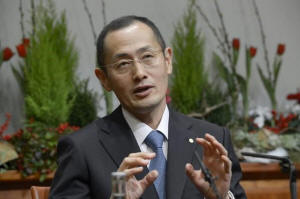|
Education Minister Yoshimasa Hayashi's comments came a day after
Kyoto University announced that a researcher at Yamanaka's
research unit had falsified data in his paper published last
year in the U.S. scientific journal Stem Cell Reports.
The misconduct "is something that shakes the people's trust in
research activities and is extremely regrettable," Hayashi told
reporters. "We would like to instruct Kyoto University to do its
utmost to prevent a recurrence."
Yamanaka in 2012 shared a Nobel Prize for medicine with British
scientist John Gurdon for the discovery that adult cells can be
transformed back into embryo-like stem cells that may one day
regrow tissue in damaged brains, hearts or other organs.
"I regret and reflect that the research paper misconduct like
this happened," Yamanaka told reporters. "I offer my heartfelt
apology."
Kyoto University has already asked for retraction of the paper.
In a recent case of discredited research findings, Japanese
scientist Haruko Obokata in 2014 detailed simple ways to
reprogram mature animal cells back to an embryonic-like state in
research papers published in the scientific journal Nature.
But questions soon arose about her research as other scientists
could not replicate the claims and a research institute she was
working for said she had plagiarized and fabricated parts of the
papers.
(Reporting by Kiyoshi Takenaka; Editing by Nick Macfie)
[© 2018 Thomson Reuters. All rights
reserved.] Copyright 2018 Reuters. All rights reserved. This material may not be published,
broadcast, rewritten or redistributed.

|







